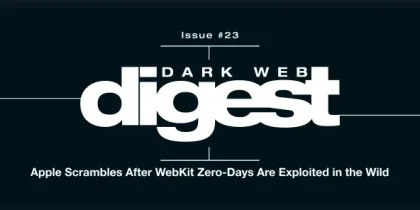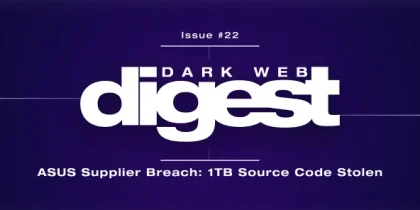Your email could be compromised.
Scan it on the dark web for free – no signup required.
Imagine waking up to see your PayPal login — your email and password — up for sale on the dark web.
That’s exactly what hackers are claiming right now. A new storm has hit PayPal users — but this time, the situation is more complicated than it looks.
Nearly 16 million (15.8 million to be exact) PayPal credentials, in plaintext, were dumped online for the price of a second-hand laptop. While at first glance this sounds like a fresh mega-breach, the story takes a twist.
According to PayPal, this isn’t a new incident but a resurfacing of data tied to a 2022 credential-stuffing attack. However, hackers on the other side say it’s fresh data from May.
Here’s what you need to know about one of the most confusing — and potentially dangerous — PayPal breach.
TL;DR: What You Need to Know
- Attack Scale: 15.8M PayPal credentials (emails + plaintext passwords) for sale
- Price Tag: Entire dataset offered for just $750 on dark web forums
- Seller: Hacker alias Chucky_BF
- Data Contents: Emails, reused plaintext passwords, PayPal-specific URLs (desktop + mobile)
- Risk: Massive potential for credential-stuffing, phishing, fraud, and account takeovers
- Source Suspected: Likely infostealer malware (not a PayPal breach)
- What To Do: Reset your PayPal password, enable 2FA, check for infostealer infections, and scan the dark web for exposure
- Dark Web Tip: Run a free Dark Web Exposure Scan to see if your data is at risk
What’s Really Happening Here?
PayPal has confirmed a breach that compromised user accounts following a surge in social engineering campaigns. Unlike typical malware-driven attacks, this breach hinged on convincing phishing messages disguised as official PayPal communications.
Victims were lured into entering credentials on fake sites, while attackers layered in phone-based phishing to bypass security alerts. The result? Account metadata, personal details, and even partial payment information ended up in criminal hands.
What Was Leaked?
The exposed data includes:
- Login emails
- Plaintext passwords
- Associated URLs
- Variants
Why does this matter? Metadata, often overlooked, is a goldmine for attackers. It enables them to fine-tune scams, impersonate users with frightening accuracy, and even craft spear-phishing attacks that feel eerily personal.
What Kind of Attack Is This?
This isn’t a PayPal system breach. It’s the byproduct of infostealer malware, which:
- Slips into your device via shady links, cracked software, or fake apps.
- Extracts passwords, autofill data, cookies, and credit card info silently.
- Sends everything back to cybercriminals, often deleting itself afterward.
- Packages the loot with associated URLs (like paypal.com/signin)—making it plug-and-play for credential-stuffing bots.
Basically: Hackers didn’t hack PayPal. They hacked you.
Who’s Behind It?
While PayPal hasn’t named a specific threat actor, security researchers point to patterns consistent with cybercrime groups known for financial fraud operations.
- Initial leads suggest ties to actors previously active on Genesis Market, a dark web marketplace specializing in stolen logins.
- Indicators also overlap with groups running vishing campaigns against banks and fintech companies earlier this year.
- Their hallmark? Low-tech, high-impact tactics — skipping malware in favor of manipulating human trust.
This is a classic case of social engineering outsmarting technical defenses.
According to Bitdefender, the hacker behind this alleged leak, Chucky_BF, claims to be sitting on a goldmine: 15.8 million PayPal logins, complete with passwords and endpoint URLs.
But the price — just $750 for all of it — raises eyebrows. Why sell such “valuable” data so cheap? Experts suggest two possibilities:
- Low-Quality / Recycled Data → Old or already exploited credentials, rebranded for hype. The dark web brokers may be recycling previously stolen credentials.
- Infostealer Malware Dumps → Malicious software and malware like RedLine, Vidar, Raccoon siphons are designed to quietly harvest login details, cookies, and autofill data — have become one of the fastest-growing underground threats. Not PayPal’s fault.
Their popularity lies in volume: once a user’s machine is infected, attackers can scoop up hundreds of account logins at once, which later get resold or bundled in dark web marketplaces.
What PayPal Says
PayPal responded to the resurfaced data reports with a clear statement:
“There has been no data breach – this is related to an incident in 2022 and not new,” PayPal said.
While this reassures customers that PayPal’s systems weren’t recently compromised, the re-emergence of old data on the dark web still carries serious implications for affected users.
Why It Still Matters (Even If Old)
Even if PayPal’s denial holds, here’s why this “leak” still stings:
- Reused Passwords = Easy Wins → If you used the same PayPal password on Amazon, Netflix, or Gmail, you’re cooked.
- Phishing Fuel → Plaintext logins + URLs = perfectly tailored scam campaigns.
- Dark Web Resale → Even weak data gets repackaged and resold endlessly.
Think of it like buying second-hand keys—maybe not all fit, but enough still open doors.
Why This Is a Wake-Up Call
Even though PayPal insists this isn’t a new hack, the danger is far from over. Most people assume a single leaked password is harmless — but in reality, it can set off a domino effect. If you reuse passwords across multiple accounts (banking, shopping, social media, even work logins), a breach like PayPal’s becomes the skeleton key hackers use to unlock your entire digital life.
Attackers don’t stop at your PayPal balance. They can:
- Launch phishing campaigns using your personal details to trick you or your contacts.
- Commit financial fraud by linking your PayPal to fake purchases or draining connected cards.
- Hijack identities for scams, loan applications, or even opening new accounts in your name.
- Sell your credentials on the dark web, where automated tools (credential stuffing bots) test them across thousands of platforms.
In short: a “recycled” breach can still spark brand new compromises. If you haven’t updated your credentials since 2022 — or if you’re guilty of reusing passwords across accounts — you’re still at risk today.
This is why security experts stress the importance of unique, strong passwords and proactive monitoring. Because if one password is exposed, and it’s reused elsewhere, your entire online presence becomes vulnerable.
How to Stay Safe (Right Now)
Here’s the playbook to lock things down:
- Run a Dark Web Exposure Scan — PureVPN offers a free scan (also link above) that allows users to check if their credentials are floating around underground markets. It reveals:
- If your info appears in recent breaches
- How recent the leak was
- How many times your data was exposed
- What was exposed (email, IP, password snippet, etc.)
- Reset Your PayPal Password — Make it strong, unique, and not reused.
- Change Reused Passwords Elsewhere — Especially for banking, email, and shopping accounts.
- Turn On Two-Factor Authentication (2FA) — Prefer authenticator apps or hardware keys over SMS.
- Check for Infostealers – Scan your device for malware, especially if you’ve installed cracked apps or sketchy browser plug-ins.
- Use a Password Manager – Ditch browser-saved logins; password managers are far safer.
- Monitor Your Accounts – Set PayPal login alerts and check your bank statements regularly.
What’s Next
The PayPal breach is a reminder that financial platforms remain prime targets for cybercriminals, and social engineering is their weapon of choice. We’ll be tracking dark web chatter and new fraud attempts tied to this incident in the coming weeks.
If you’ve used PayPal recently, don’t assume silence means safety. Run PureVPN’s free Dark Web Exposure Scan now to see if your data is already circulating.
Why Subscribe?
Every week, we cut through the noise and bring you the breaches that matter, the tactics behind them, and the steps you need to protect yourself — all in a conversational, no-fluff format.
If you don’t want to be the last to know when your personal data hits the dark web, subscribing is your safety net.
Stay ahead, stay secure, stay subscribed.
Note: This edition of Dark Web Digest is based on publicly available information as of Aug 18, 2025. PayPal has confirmed that the resurfaced data is linked to a 2022 incident, not a new breach.








